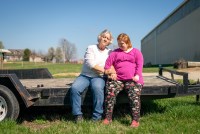Latest KFF Health News Stories
Familias huyen de los estados que niegan atención de salud a las personas trans
Más de una cuarta parte de los adultos trans encuestados por KFF y The Washington Post a fines del año pasado dijeron que se mudaron a otro vecindario, ciudad o estado en busca de un ambiente más tolerante.
Medical Exiles: Families Flee States Amid Crackdown on Transgender Care
As more states restrict gender-affirming care for transgender people, some are relocating to more welcoming destinations, such as California, Illinois, Maryland, and Nevada, where they don’t have to worry about being locked out of medical care.
What Does a Chatbot Know About Eating Disorders? Users of a Help Line Are About to Find Out
The National Eating Disorders Association’s help line has seen demand climb to unsustainable levels since the beginning of the covid pandemic, with more people reporting severe mental health problems, the nonprofit says. But staffers worry this chatbot may make things worse.
More States OK Postpartum Medicaid Coverage Beyond Two Months
Montana, Alaska, Mississippi, Missouri, South Dakota, Texas, Utah, and Wyoming are among the latest states moving to provide health coverage for up to a year after pregnancy through the federal-state health insurance program for low-income people.
Journalists Give Status Reports on the ‘Personhood’ Debate and the HIV Epidemic
KFF Health News and California Healthline staff made the rounds on national and local media this week to discuss their stories. Here’s a collection of their appearances.
Can a Fetus Be an Employee? States Are Testing the Boundaries of Personhood After ‘Dobbs’
Laws granting rights to unborn children have spread in the decades since the U.S. and Missouri supreme courts allowed Missouri’s definition of life as beginning at conception to stand. Now, a wrongful death lawsuit involving a workplace accident shows how sprawling those laws — often intended to curb abortion — have become.
People With Down Syndrome Are Living Longer, but the Health System Still Treats Many as Kids
The median life expectancy for a U.S. baby born with Down syndrome jumped from about four years in 1950 to 58 years in the 2010s. That’s largely because they no longer can be denied lifesaving care, including surgeries for heart defects. But now, aging adults with Down syndrome face a health system unprepared to care for them.
Se pagarán $50,000 millones como liquidación del acuerdo sobre opioides. Veremos cómo se gastan
La mayoría de los acuerdos estipulan que los estados deben gastar al menos el 85% del dinero que recibirán, en los próximos 15 años, en el tratamiento y la prevención de adicciones.
States Try to Obscure Execution Details as Drugmakers Hinder Lethal Injection
Pharmaceutical companies have put the brakes on many states’ ability to execute prisoners using lethal injections. Lacking alternatives, states are trying to keep the public from learning details about how they carry out executions.
$50 Billion in Opioid Settlement Cash Is on the Way. We’re Tracking How It’s Spent.
Spending the money effectively and equitably is a tall order for state and local governments, and a lack of transparency in the process is already leading to fears of misuse.
Legal Questions, Inquiries Intensify Around Noble Health’s Rural Missouri Hospital Closures
A year after private equity-backed Noble Health shuttered two rural Missouri hospitals, a slew of lawsuits and state and federal investigations grind forward. Missouri Attorney General Andrew Bailey recently confirmed an “ongoing” investigation as former employees continue to go unpaid and cope with unpaid medical claims.
Temp Nurses Cost Hospitals Big During Pandemic. Lawmakers Are Now Mulling Limits.
Missouri is considering making it a felony to jack up temporary health care staffing prices during a statewide or national emergency. It’s one of at least 14 states looking to reel in travel nurse costs, after many hospitals struggled to pay for needed staffers earlier in the covid pandemic.
Why Two States Remain Holdouts on Distracted Driving Laws
Missouri and Montana are the only states without distracted driving laws for all drivers. With traffic fatalities rising significantly nationwide, some Missouri lawmakers and advocates for roadway safety are eyeing bills in the new legislative session that would crack down on texting while driving in the Show Me State.
Abortion Debate Ramps Up in States as Congress Deadlocks
Abortion is a top issue for state lawmakers meeting for their first full sessions since Roe v. Wade was overturned.
NY requiere que doctores receten naloxona a algunos pacientes que toman analgésicos opioides
Aunque los titulares son por las muertes por sobredosis de drogas ilícitas vendidas en la calle, el riesgo de sufrirlas también es real para los pacientes que toman opioides recetados por sus médicos.
NY Docs Are Now Required to Prescribe Naloxone to Some Patients on Opioid Painkillers
This strategy — now in place in at least 10 states — is part of an effort to curb accidental opioid overdose deaths by patients who take these powerful medications.
How Medicare Advantage Plans Dodged Auditors and Overcharged Taxpayers by Millions
Facing rare scrutiny from federal auditors, some Medicare Advantage health plans failed to produce any records to justify their payments, government records show. The audits revealed millions of dollars in overcharges to Medicare over three years.
KHN Investigation: The System Feds Rely On to Stop Repeat Health Fraud Is Broken
A months-long KHN examination of the system meant to bar fraudsters from Medicaid, Medicare, and other federal health programs found gaping holes and expansive gray areas through which banned individuals slip to repeatedly bilk taxpayer-funded programs.
More States to Consider Extending Postpartum Medicaid Coverage Beyond Two Months
Fifteen states haven’t moved to extend Medicaid coverage for new moms beyond the minimum of 60 days after birth. But at least four of those holdout states — Montana, Wyoming, Missouri, and Mississippi — are expected to consider proposals to extend coverage in their upcoming legislative sessions.
The Disability Tax: Medical Bills Remain Inaccessible for Many Blind Americans
Health insurers and health care systems across the country are violating disability rights laws by sending medical bills that blind and visually impaired people cannot read, a KHN investigation has found. By hindering the ability of blind Americans to know what they owe, some bills get sent to debt collections.
























